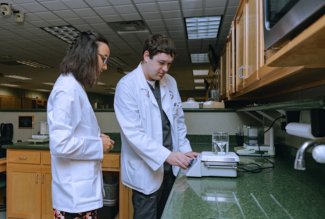
Ohio Northern University’s HealthWise Pharmacy, a key campus learning center for pharmacy students, now offers compounding services to the community, for people as well as pets and other animals. It’s a service that provides customized medications for a variety of health-related conditions, and can serve as a convenient solution to typical medication barriers.
“Compounding is the formulation of medications that are not commercially available,” explains Ryan Waldschmidt, CPESN Ohio resident at ONU HealthWise Pharmacy and Jackson Pharmacy and Wellness Center. “Medications may need to be compounded to meet individual patient or veterinary needs, such as unique drugs, unique doses, or dosage forms, including liquids, creams, or suppositories. Compounded medicines may be needed for purposes such as pain management, dermatological conditions, or bio identical hormone replacement therapy. Compounding is often needed when a commercially available medicine isn’t right for the patient or animal." Some examples of compounded medicines include:
· Eliminating ingredients in a medicine to which a patient is a allergic;
· Changing the dosage form (for instance, making a liquid for a patient who can’t swallow a pill);
· Combining medicines together (turning many pills into one combination pill);
· Providing a unique strength of the medication;
· Making medicines when they are unavailable or in short supply;
· Making medicines for pets or other animals, in the right dose and dosage form.
“Rather than switching medications or going without, patients can often benefit instead from compounding,” Waldschmidt says, “with the request made by physicians, veterinarians and other prescribers.”
“To get the word out about this service, I plan to form relationships with physicians and veterinarians in the surrounding communities to share with them the benefits of compounding medications,” says Waldschmidt. “The more prescribers become aware of the options that compounding provides for them and their patients, the more our patients will benefit.”
Although pharmacology originated with compounding, only about 7,500 of the approximately 56,000 community based pharmacies in the United States specialize in compounding services today, according to the American Pharmaceutical Association. All, including the program at ONU HealthWise Pharmacy, are state regulated.
For now, the compounding that ONU HealthWise Pharmacy provides does not include injectables or other sterile compounds. “There are very tightly regulated restrictions regarding sterile compounds” says Waldschmidt. The ONU HealthWise “nonsterile” compounding program does not indicate uncleanliness, but adherence to regulations that are less stringent than are required for sterile products, such as intravenous medications. “Nonsterile compounding does not require a sterile environment, and involves dosage forms like capsules, tablets, creams, ointments, liquids, suspensions, suppositories, dog/cat chew treats and more,” Waldschmidt notes.
Along with enhancing access for people in the region to advanced pharmacy services, ONU’s Raabe College of Pharmacy provides training to student pharmacists in compounding, and the service is a valuable hands-on learning opportunity. “Providing compounding in the services available at our pharmacy will give students the opportunity to make medicine for real patients, beyond what we teach them in our compounding lab courses,” says Waldschmidt, who has also compiled a training program for interested students and other HealthWise Pharmacy staff.
For more information on ONU HealthWise’s compounding services, call the pharmacy at 419-772-3784 from Monday through Friday between 10 a.m. and 6 p.m.; or on Saturday between 10 a.m. and 2 p.m. The pharmacy can also be reached by email hwpharmacy@onu.edu.